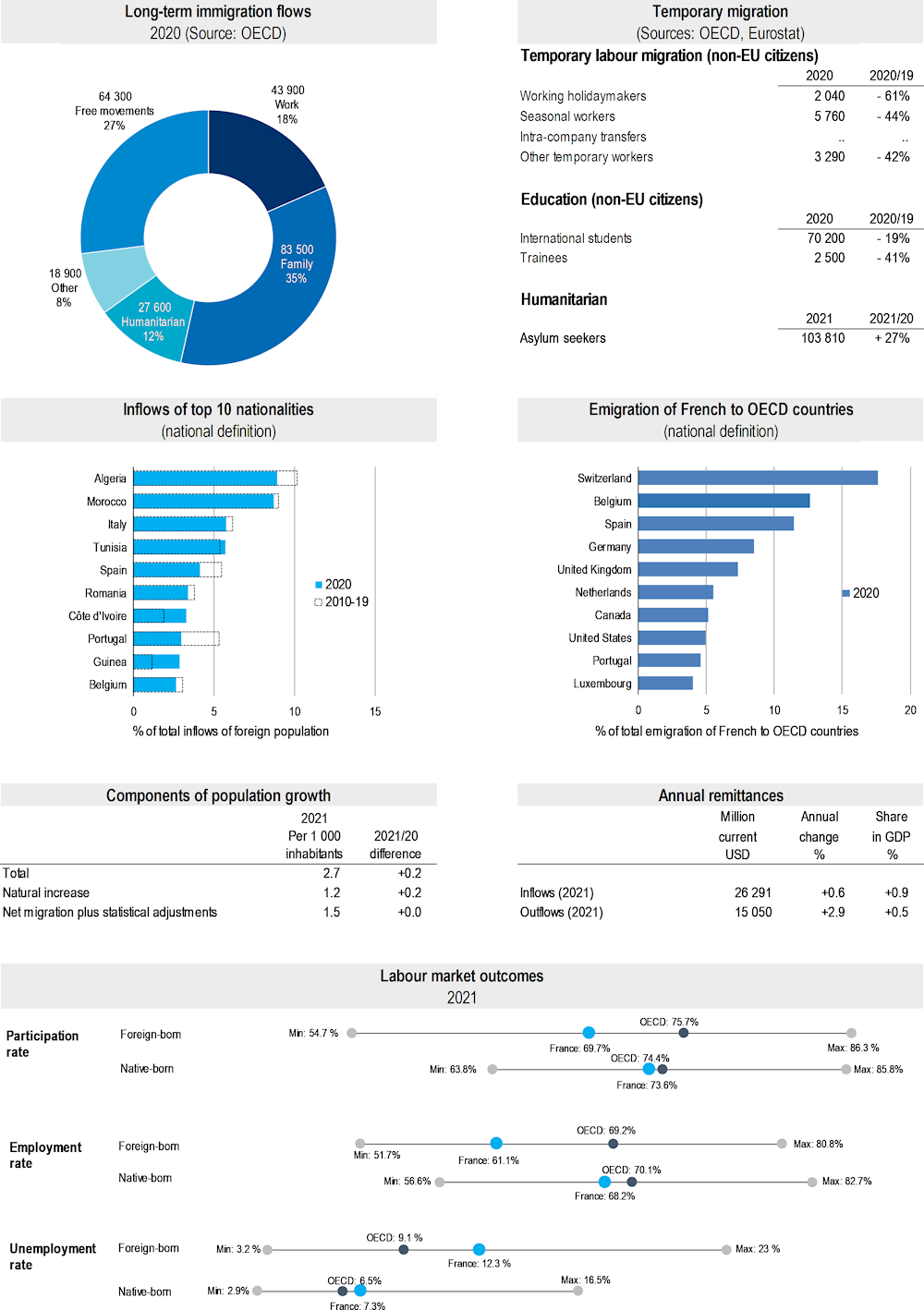In 2020, France received 238 000 new immigrants on a long-term or permanent basis (including changes of status and free mobility), ‑18.1% compared to 2019. This figure comprises 27% immigrants benefitting from free mobility, 18.4% labour migrants, 35% family members (including accompanying family) and 11.6% humanitarian migrants. Around 70 000 permits were issued to tertiary-level international students and 14 000 to temporary and seasonal labour migrants (excluding intra-EU migration). In addition, 308 000 intra-EU postings were recorded in 2020, a decrease of ‑32% compared to 2019. These posted workers are generally on short-term contracts.
Algeria, Morocco and Italy were the top three nationalities of newcomers in 2020. Among the top 15 countries of origin, Guinea registered the strongest increase (1 000) and Morocco the largest decrease (‑5 100) in flows to France compared to the previous year.
In 2021, the number of first asylum applicants increased by 27%, to reach around 104 000. The majority of applicants came from Afghanistan (16 000), Côte d’Ivoire (6 200) and Bangladesh (6 200). The largest increase since 2020 concerned nationals of Afghanistan (6 000) and the largest decrease nationals of Angola (‑900). Of the 137 000 decisions taken in 2021, 25% were positive.
An online residence permit application service was opened for international students in 2020. On 24 March 2021, a new online application platform has been implemented for some other types of residence permits based on digitalised documents. The deployment of this e‑service will be gradual and will eventually concern all applications. As of 6 April 2021, work authorisations must also be submitted through a new Online Application Platform. Processing criteria have been adapted, especially lifting the qualification-occupation matching and focusing on the employers’ efforts rather than on shortage indicators. The Shortage Occupation List, which was last published in 2008, has been updated in 2021 with some regional specificities. The lists, which exempt an extended number of occupations from the labour market test, are planned to be updated regularly. The Labour Authorities (“DIRECCTE”) are no longer involved in application processing and are replaced by interregional platforms.
In 2021, France signed an agreement with Peru on the implementation of a working holiday programme, and a partnership agreement with India to facilitate the mobility of students, academics, researchers, as well as other labour migration and to encourage the mobility of skills and talents.
A national plan for reception of asylum seekers and integration of refugees has been launched for 2021‑23. The plan includes concrete actions to better identify vulnerable groups and improve their support. Accordingly, the accommodation capacity has been increased, alongside a better spread across the territory. Following the increase in the numbers of unaccompanied minors in France, a new system registering individual data was also gradually deployed in 2020 in order to better guarantee child protection and avoid transfers between departments. In addition, clearer instructions facilitating the residence permit applications of unaccompanied minors at 18 years old have been provided.
France is continuing to assess measures to strengthen integration of newly arrived third-country nationals and to suggest complementary measures to the Republican Integration Contract, with a growing priority on French language courses. Those complementary schemes focus on the labour market integration of immigrant women, tackling the digital divide, promoting internal mobility of humanitarian migrants from the capital region to other regions and improving their access to mental health support. Projects enabling relationships between newcomers and the host-country society are receiving special attention, in particular those involving young French nationals in the reception and integration of immigrants of the same age and mentorship programmes with volunteers. In addition, training programmes towards reception services and language learning professionals are encouraged. As regards French citizenship applications, the level of French language required was increased in 2020.
For further information: https://www.immigration.interieur.gouv.fr/Immigration | https://accueil-integration-refugies.fr/

